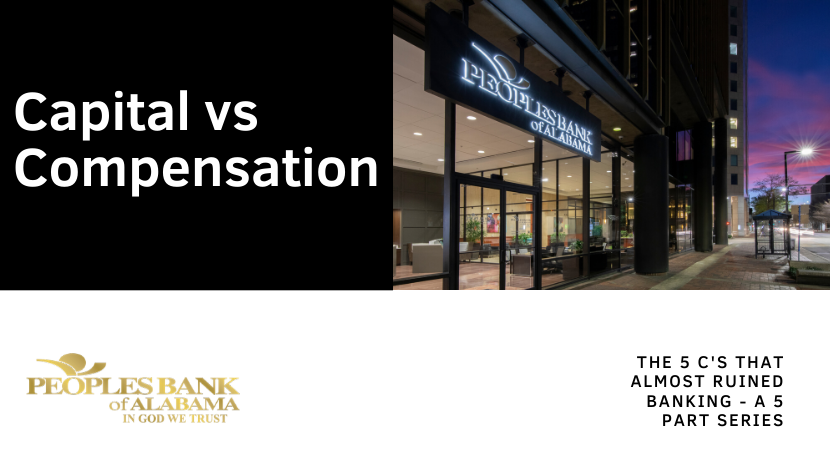The 5 C's That Almost Ruined Banking, Part 3

This is a series addressing the changes we have seen in Small Business underwriting, specifically as applied to the “5 C’s of Credit.” The prior articles focused on how the first two “C’s” called Character (a measurement of intentionally) and Capacity (the borrower’s ability to repay the loan from operations) were replaced with the new words “Conceal” (skeletons kept hidden in the closet) and “Caffeine” (pressure on bankers to make loans anyway). This is how we got some of the regulations we have today.
Capital
This installment reviews the third “C” called Capital. Capital refers to the amount of cash or equity invested into the project by the borrower. The theory is that the more the borrower has at stake, the more highly committed the borrower is to seeing the loan perform. Also, more cash from the borrower means less debt from the bank. Lower debt means lower payments and when the economic conditions change, as we know they can do, a lower payment is easier to make. The historical rule of thumb is for borrowers to inject between 15% and 25%. That percentage has proven to be wise over the test of time and is still a good measurement today.
Compensation
However, some banks have replaced Capital with what I call “Compensation.” Shareholder value is driven by bank profits so as pressure from shareholders to increase stock prices mounted, banks began paying more attention to their own bank’s financial statement than to the borrower’s. Larger loans with lower down payments became easier to get and were more profitable to the bank. The sub-prime mortgage industry even made loans at 125% of appraised value because they could make more money by making larger loans. Unfortunately, this focus on the bank’s compensation overruled historical wisdom and when the economy turned, highly leveraged borrowers failed more quickly.
Shareholder value at Peoples Bank is very important to us because our associates are part owners of the bank through the ESOP plan. We all must do our part to be sure the bank’s income is as high and operating expenses are as low as possible. Our management team knows this and works very diligently to be sure our bank value increases by making wise and careful decisions. Slow and steady wins the race. We will all be better off in the long run for it.
The Small Business Administration (SBA) offers government guaranteed loans that occasionally require lower cash injections than traditional bank financed loans. Peoples Bank is proud to be a long-time dedicated partner with the SBA and has developed a team with specialized knowledge in this area. With an SBA guarantee the risk to the bank is lower allowing us more opportunity to provide a prudent solution to the needs of your business.
If you are already a bank customer, thank you for your loyalty and please let us know of any ways we can help. For those looking for a trusted banking partner, we’d love the opportunity to earn your business.
